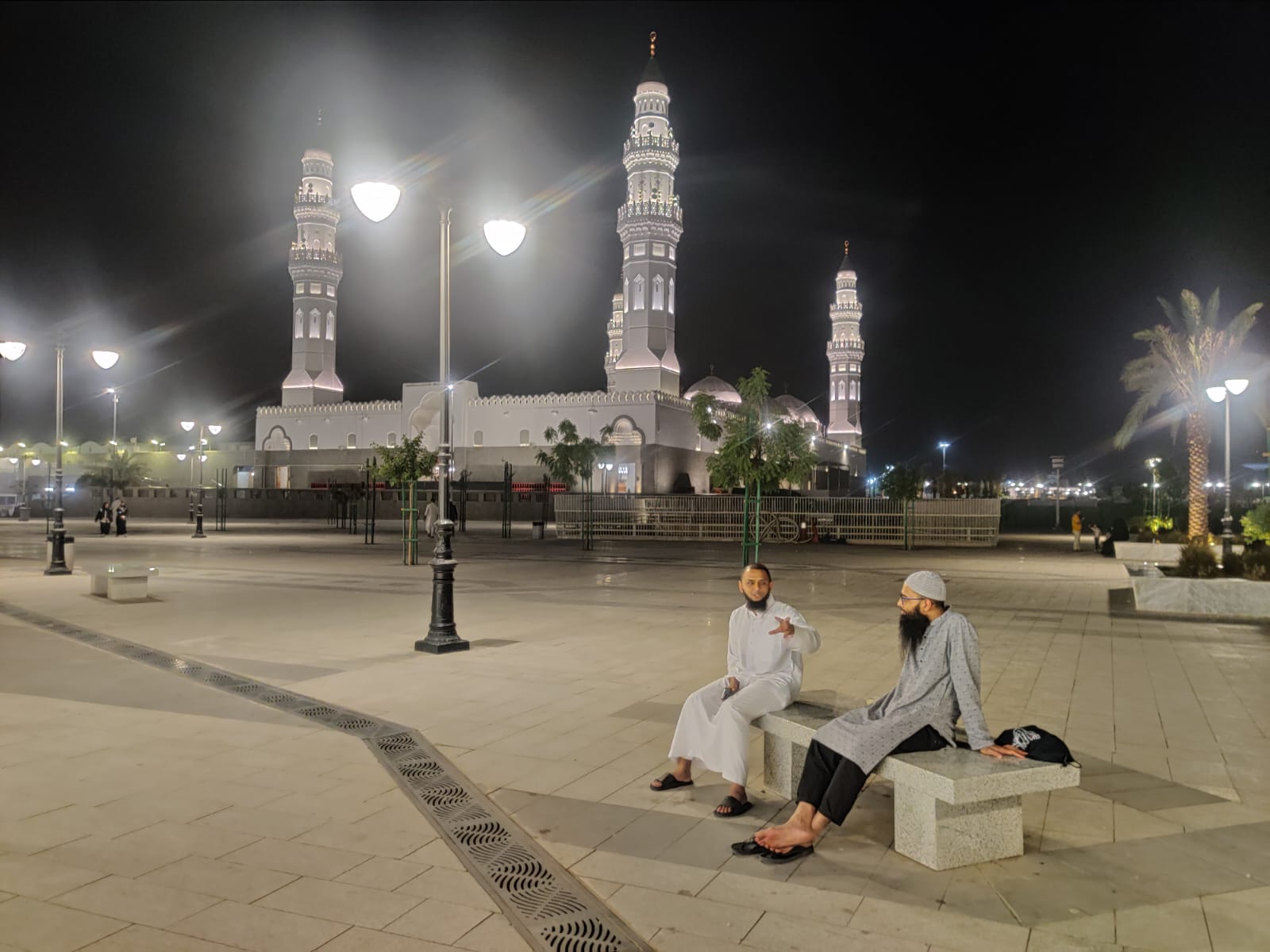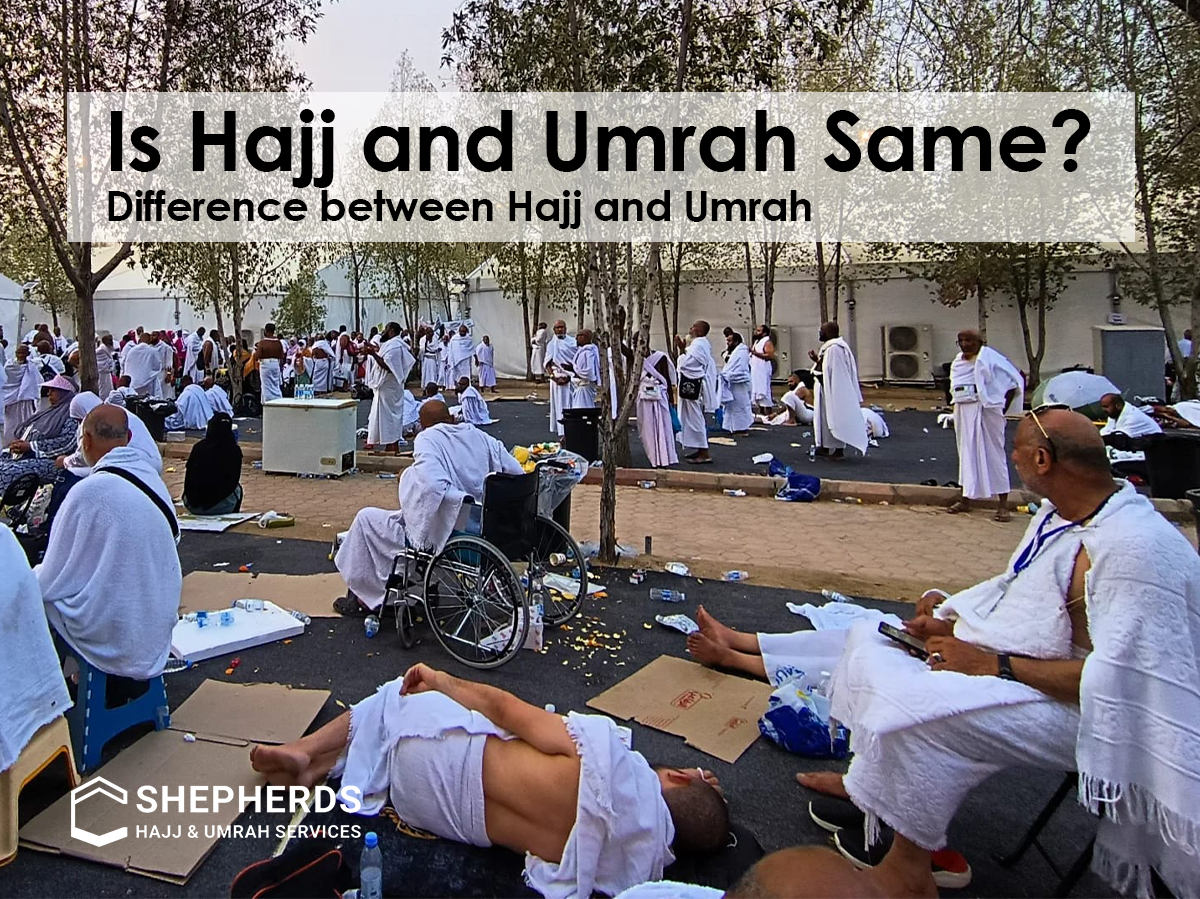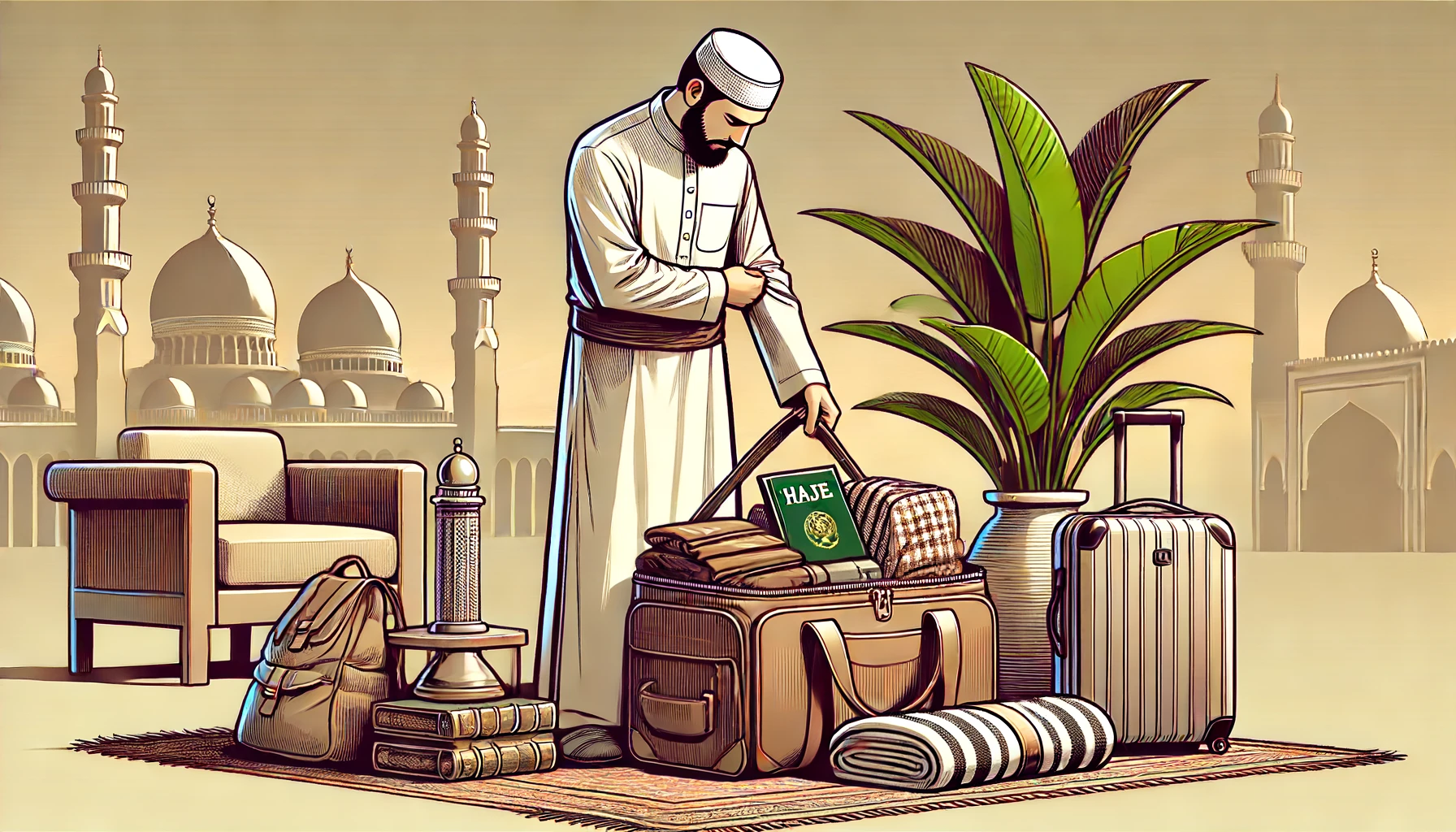Although the Hajj and the Umrah are two important Islamic religious pilgrimages that are sometimes discussed together, but they are quite distinct from each other in terms of their rituals, requirements and significance.
Hajj is a sacred pilgrimage and one of the five pillars of Islam. It’s an obligation for Muslims who are physically and financially able to undertake a journey to the holy city of Mecca in Saudi Arabia at least once in their lifetime. It occurs annually during the Islamic month of Dhu al-Hijjah.
They ask you, [O Muhammad], about the new moons. Say, “They are measurements of time for the people and for Hajj.” And it is not righteousness to enter houses from the back, but righteousness is [in] one who fears Allah. And enter houses from their doors. And fear Allah that you may succeed.
(2:189)
Umrah is a pilgrimage to Mecca, undertaken by Muslims at any time of the year, unlike Hajj, which has specific dates during the Islamic month of Dhu al-Hijjah. While Umrah is not obligatory like Hajj. Performing Umrah is a sunnah of the Prophet (peace and blessing be upon him). It’s an act of worshipping Allah that clears all the sins and purifies the heart and soul.
Indeed, as-Safa and al-Marwah are among the symbols of Allah. So whoever makes Hajj to the House or performs ‘umrah – there is no blame upon him for walking between them. And whoever volunteers good – then indeed, Allah is appreciative and Knowing.
(2:158)
Hajj and Umrah are both important journeys for Muslims to Mecca, but they’re quite different. Hajj is a mandatory pilgrimage with specific rituals and dates, while Umrah is a recommended trip that can be done at any time. These pilgrimages vary in their rules, timings, and levels of importance in the Islamic faith, offering diverse spiritual experiences for those who undertake them.

Requirement:
For Hajj and Umrah both A Muslim should be over puberty and physically able to make the journey and should be able to afford the journey financially. Muslim woman should be accompanied by a Mahram man (her husband or a male relative, whom she cannot marry, like her brother).
Timing:
Hajj:
Hajj takes place during the same time each year, in the sacred month of Dhul Hijjah – the twelfth month in the Islamic Calendar. Hajj begins on the 8th of Dhul Hijjah and lasts approximately five to six days depending on the sighting of the moon. When the new crescent moon is sighted, Muslims around the world welcome in the four-day festival of Eid al-Adha.
Umrah:
There are no particular months or days designated for Umrah, allowing Muslims to undertake this pilgrimage based on their convenience and readiness. This flexibility enables individuals to plan and perform Umrah according to their schedules, financial capabilities, and personal circumstances.
Duration:
Hajj:
The duration of Hajj, the Islamic pilgrimage to Mecca, typically lasts around 5-6 days. However, the entire journey might involve additional travel time, preparation, and rituals before and after the core days of Hajj. Pilgrims embark on a journey that involves spiritual preparation, travel arrangements, and various rites and ceremonies.
The entire pilgrimage encompasses a series of activities, including arrival in Mecca, the performance of Tawaf (circumambulation) around the Kaaba, standing in prayer at Mount Arafat, symbolic stoning of the Devil, and the sacrifice of an animal, among other significant rites. The overall duration can vary based on individual travel plans, group arrangements, and the specific schedule of events outlined for the pilgrimage.
Umrah:
The duration of an Umrah pilgrimage is typically shorter compared to Hajj. Umrah can range from a few days to a week, depending on various factors such as travel arrangements, individual or group schedules, and the chosen itinerary.
The core rituals of Umrah involve performing Tawaf (circumambulation) around the Kaaba, Sa’i (walking between Safa and Marwa), and other essential acts of worship in and around Mecca. Pilgrims often plan their visit to include additional days for personal prayers, exploration, and religious activities beyond the mandatory rites of Umrah.
Importance and obligation:
Hajj:
Hajj holds immense importance in Islam and is considered one of the five pillars of the faith, obligatory for those who are physically and financially capable. Hajj is a profound spiritual journey that symbolizes the unity of Muslims, their submission to Allah, and equality among all believers regardless of social status, nationality, or ethnicity.
Hajj cleanses a person of their sins, offering a fresh start and the opportunity for spiritual renewal. Hajj brings together Muslims from all corners of the world, fostering a sense of unity, solidarity, and brotherhood among believers. Pilgrims find Hajj to be a life-changing experience, providing opportunities for self-reflection, spiritual growth, and increased devotion to Allah.
O Amr! Do you not know that embracing Islam washes away all sins committed before it (during disbelief)? And that migration (Hijrah) washes away all sins committed before it. And that Hajj wipes out all sins committed before it
[Muslim]
1. Pillar of Islam: Hajj is one of the five pillars, foundational acts of worship in Islam, alongside the declaration of faith, prayer, charity (zakat), and fasting during Ramadan.
2. Obligatory Act: It’s compulsory for Muslims who meet specific criteria—being mentally, physically, and financially capable—to perform Hajj at least once in their lifetime.
Umrah:
The Prophet (peace and blessing be upon him) performed Umrah four times during his life so Performing Umrah is a sunnah of the Prophet (peace and blessing be upon him).
According to the Hanafi and Maliki schools of thought, Umrah is not Fardh (obligatory) but is considered a Sunnah Mu’akkadah (emphasized Sunnah). On the other hand, the performance of Umrah is considered Fardh according to the Shafi’i and Hanbali schools of thought, just like Hajj. Umrah holds a special place in Islam and while it is not obligatory like Hajj, it carries significant importance for Muslims.
Umrah is a recommended, non-compulsory pilgrimage that Muslims undertake at any time of the year, unlike Hajj which has specific dates. Performing Umrah allows Muslims to engage in acts of worship, supplication, and reflection, seeking closeness to Allah and seeking forgiveness. Muslims consider Umrah as a significant spiritual journey, allowing them to deepen their faith, seek spiritual growth, and cleanse themselves spiritually. Visiting the sacred places in Mecca and participating in the rituals helps in reinforcing one’s faith and strengthening the bond with the Islamic faith.
Allah’s Apostle said, (The performance of) `Umra is an expiation for the sins committed (between it and the previous one). And the reward of Hajj Mabrur (the one accepted by Allah) is nothing except Paradise.
(Sahih Al Bukhari 1: Chapter 27, Hadith 1773)
While Umrah is not obligatory, it remains a significant and recommended act of worship in Islam. It provides an opportunity for spiritual rejuvenation, a closer connection to the faith, and a personal journey of devotion and reflection for Muslims.
Attire (Ihram):
The attire for Hajj and Umrah is same.
Man: Men must wear two pieces of white, unsewn, plain cloth as part of the Ihram – an Izar (waist-wrapper) and a Rida (covering for the upper body, like a shawl). It is also recommended that you take an additional set-in case your main Ihram garments become impure.
Woman: Hajj clothing for women is not as prescriptive. They may wear any color as long as all parts of the body – except for the hands and face – are covered by cloth. However, many women in Ihram wear black or white abayas and hijabs.
Rituals:
Hajj and Umrah involve acts of worship, devotion, and spiritual significance, yet they differ in terms of obligation, duration, specific rituals, and their place within Islamic practice.
Hajj Rituals:
Hajj consists of several essential rituals, including:
Ihram: Pilgrims enter the state of ihram by donning the prescribed clothing (white, seamless garments for men) and observing specific restrictions.
Tawaf: Pilgrims perform Tawaf, which involves circling the Kaaba seven times in a counterclockwise direction.
Sa’i: After Tawaf, pilgrims perform Sa’i, walking seven times between the hills of Safa and Marwah.
Wuquf in Arafah: On the 9th day of Dhul-Hijjah, pilgrims gather in the plain of Arafah, engage in supplication, and seek forgiveness from Allah.
Muzdalifah: After sunset, pilgrims move to Muzdalifah, spend the night there, and collect pebbles for the next ritual.
Stoning of the Devil: Pilgrims stone the three pillars in Mina, symbolizing the rejection of evil.
Qurbani: pilgrims sacrifice an animal, usually a sheep or goat, symbolizing Prophet Ibrahim’s willingness to sacrifice his son, as an act of obedience to Allah.
Halq or Taqseer: Pilgrims shave their heads completely or trim their hair to mark the completion of Hajj rituals.
Tawaf al-Ifadah: Pilgrims return to the Kaaba to perform Tawaf al-Ifadah, which signifies the completion of Hajj.
Sa’i of Hajj: After Tawaf, pilgrims perform Sa’i between Safa and Marwah once again.
Umrah Rituals:
Umrah consists of the following rituals:
Ihram: Like Hajj, pilgrims enter the state of ihram by wearing the prescribed clothing and adhering to the associated restrictions.
Tawaf: Hajj and Umrah involve acts of worship, devotion, and spiritual significance, yet they differ in terms of obligation, duration, specific rituals, and their place within Islamic practice. perform Tawaf, circling the Kaaba seven times in a counterclockwise direction.
Sa’i: After Tawaf, pilgrims perform Sa’i, walking between Safa and Marwah seven times.
Halq or Taqseer: Similar to Hajj, pilgrims shave their heads completely or trim their hair, marking the completion of Umrah.
Relevance and Reward:
Hajj:
The Hajj and Umrah offer great spiritual benefits and rewards. On the other hand, Hajj is more important in Islam as it is mandatory. It is regarded as a chance for soul cleansing, an opportunity to ask for forgiveness, and a chance to deepen one’s relationship with Allah. A pilgrim who successfully completes the Hajj is referred to as a “Hajji” or “Hajjah.”
Umrah:
In Islam, umrah is also highly respected while being optional. It gives Muslims a chance to do acts of worship, get closer to Allah, and take in the peace of the sacred locations. Umrah is considered to atone for sins and to bring spiritual benefits.
And complete the Hajj and Umrah for Allah. But if you are prevented, then [offer] what can be obtained with ease of sacrificial animals. And do not shave your heads until the sacrificial animal has reached its place of slaughter. And whoever among you is ill or has an ailment of the head [making shaving necessary must offer] a ransom of fasting [three days] or charity or sacrifice. And when you are secure, then whoever performs ‘umrah [during the Hajj months] followed by Hajj [offers] what can be obtained with ease of sacrificial animals. And whoever cannot find [or afford such an animal] – then a fast of three days during Hajj and of seven when you have returned [home]. Those are ten complete [days]. This is for those whose family is not in the area of al-Masjid al-Haram. And fear Allah and know that Allah is severe in penalty.
(2:196)
In summary, the Hajj and Umrah are two separate Islamic pilgrimages, each with its own customs, dates, and meaning. While Umrah is optional and can be done at any time outside of Hajj, Hajj is required and occurs over a set period of time. These pilgrimages provide Muslims with spiritual advantages, enabling them to deepen their faith, ask for pardon, and get closer to Allah. Regardless matter whether someone performs the Hajj or Umrah, the trip is unquestionably significant and life-changing.
Do you want an agency to help you during the sacred journey of Hajj and Umrah? Book your Package with Shepherds today. Enjoy a smooth journey with Reliable Hajj Agency in Bangladesh.





